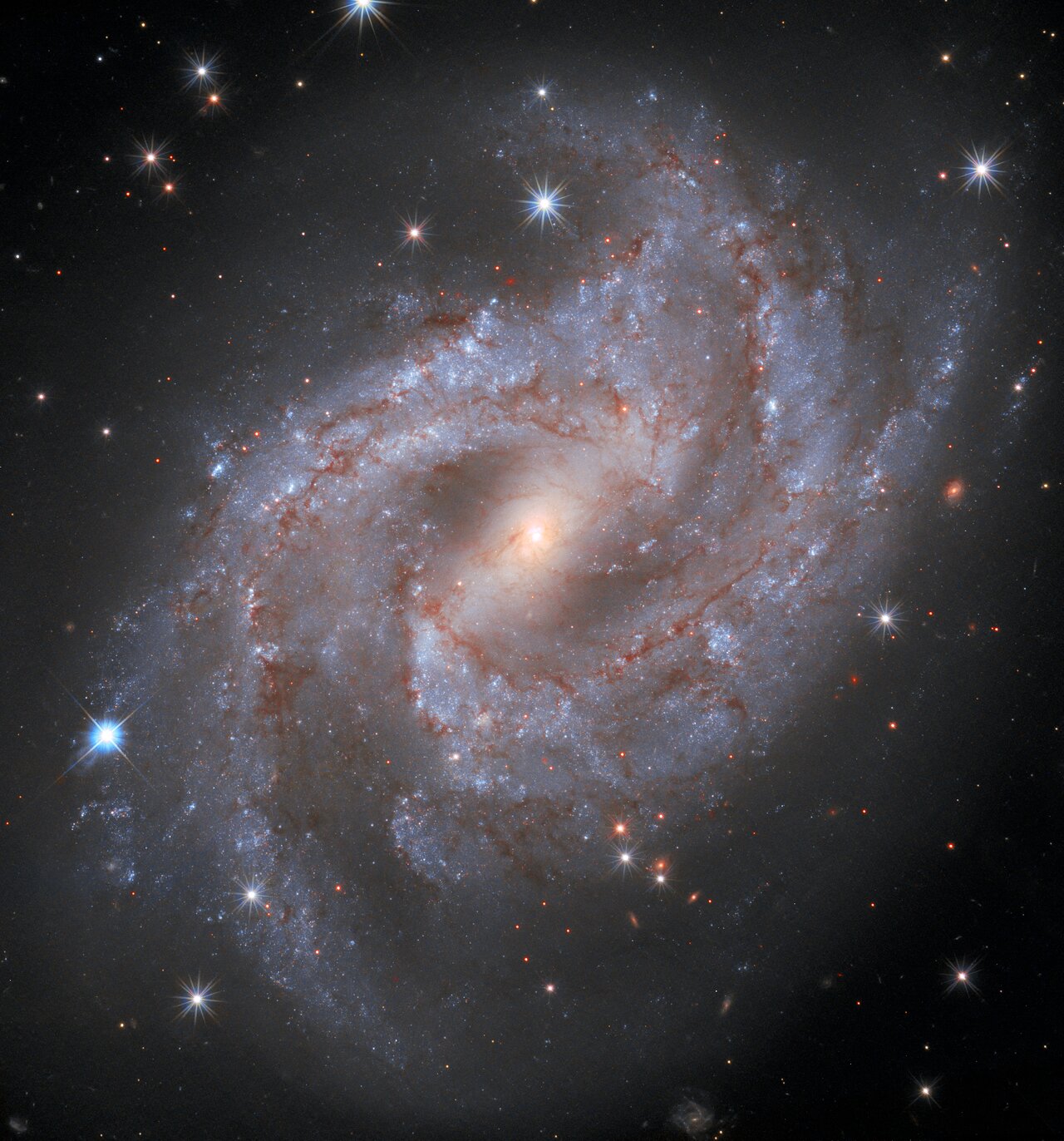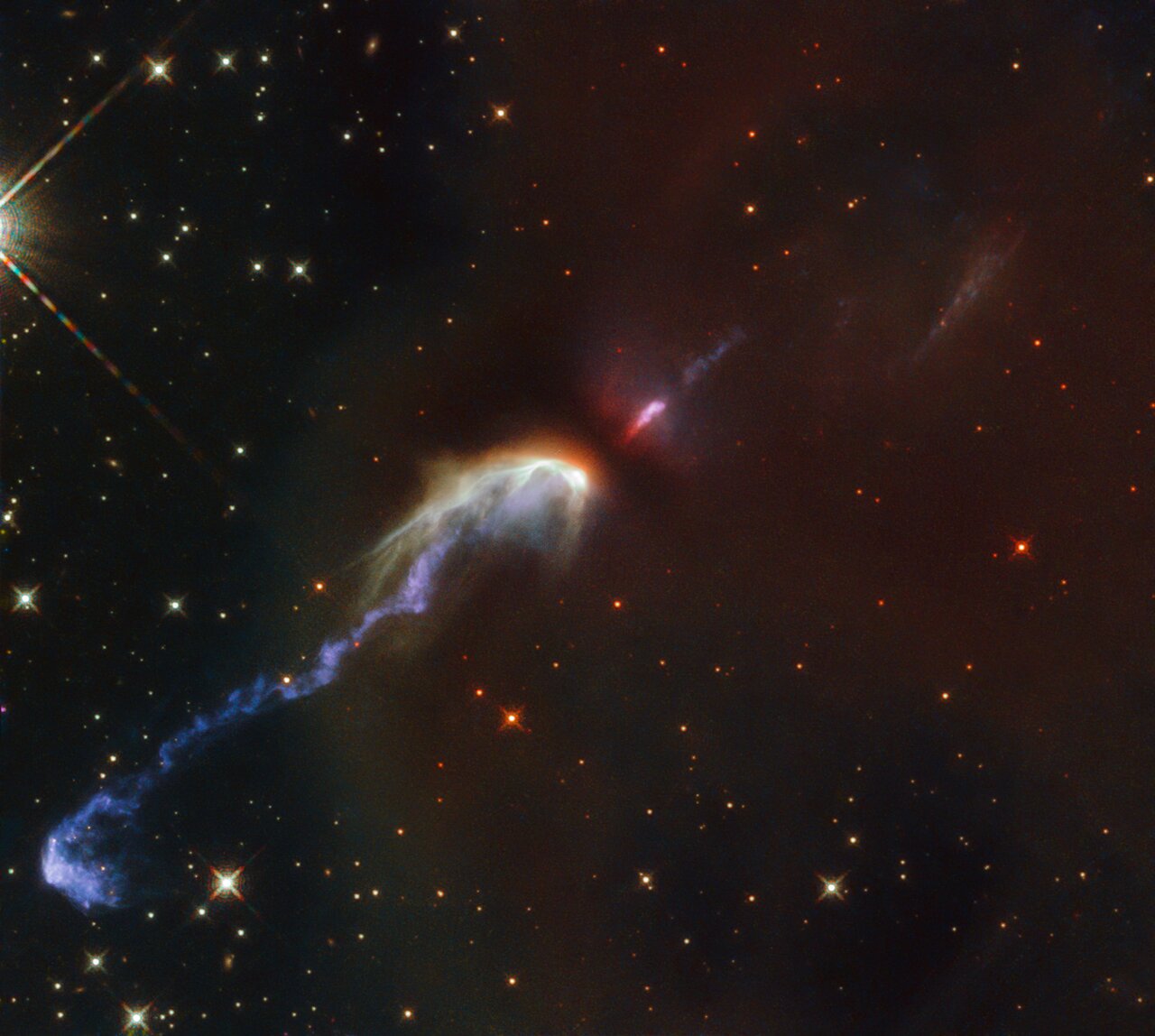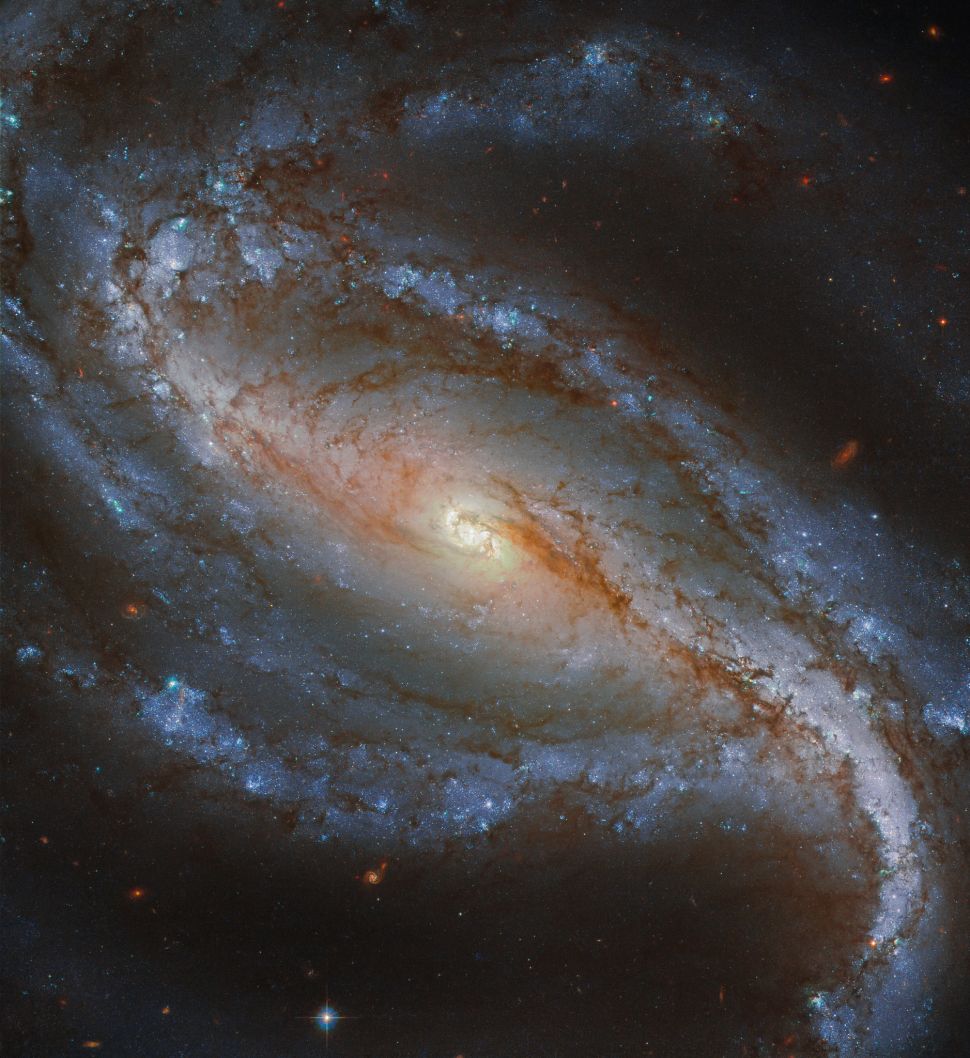Blog
De De Pierce (February 18, 1904 – November 23, 1973) was an American jazz trumpeter and cornetist. He is best remembered for the songs “Peanut Vendor” and “Dippermouth Blues”, both with Billie Pierce.
Pierce was born Joseph De Lacroix Pierce in New Orleans, Louisiana, United States. Pierce’s first gig was with Arnold Dupas in New Orleans in 1924. During his time playing in city nightclubs, he met Billie Pierce, who became his wife as well as a musical companion; the two were the house band at the Luthjens Dance Hall from the 1930s through the 1950s. They released several albums together but stopped performing in the middle of the 1950s due to illness, which left De De Pierce blind. By 1959 they had returned to performing, and De De Pierce toured with Ida Cox and played with the Preservation Hall Jazz Band, before further health problems ended his career. He died in November 1973, at the age of 69.
more...Pictured here is the captivating galaxy NGC 2525. Located nearly 70 million light-years from Earth, this galaxy is part of the constellation of Puppis in the southern hemisphere. Together with the Carina and the Vela constellations, it makes up an image of the Argo from ancient greek mythology. Another kind of monster, a supermassive black hole, lurks at the centre of NGC 2525. Nearly every galaxy contains a supermassive black hole, which can range in mass from hundreds of thousands to billions of times the mass of the Sun. Hubble has captured a series of images of NGC2525 as part of one of its major investigations; measuring the expansion rate of the Universe, which can help answer fundamental questions about our Universe’s very nature. ESA/Hubble has now published a unique time-lapse of this galaxy and it’s fading supernova.

Jeremy Webster “Fred” Frith (born 17 February 1949) is an English multi-instrumentalist, composer, and improvisor.
Probably best known for his guitar work, Frith first came to attention as one of the founding members of the English avant-rock group Henry Cow. He was also a member of the groups Art Bears, Massacre, and Skeleton Crew. He has collaborated with a number of prominent musicians, including Robert Wyatt, Derek Bailey, the Residents, Lol Coxhill, John Zorn, Brian Eno, Mike Patton, Lars Hollmer, Bill Laswell, Iva Bittová, Jad Fair, Kramer, the ARTE Quartett, and Bob Ostertag. He has also composed several long works, including Traffic Continues (1996, performed 1998 by Frith and Ensemble Modern) and Freedom in Fragments (1993, performed 1999 by Rova Saxophone Quartet). Frith produces most of his own music, and has also produced many albums by other musicians, including Curlew, the Muffins, Etron Fou Leloublan, and Orthotonics.
He is the subject of Nicolas Humbert and Werner Penzel’s award-winning 1990 documentary Step Across the Border. Frith also appears in the Canadian documentary Act of God, which is about the metaphysical effects of being struck by lightning. He has contributed to a number of music publications, including New Musical Express and Trouser Press, and has conducted improvising workshops across the world. His career spans over four decades and he appears on over 400 albums, and he still performs actively throughout the world.
Frith was awarded the 2008 Demetrio Stratos Prize for his career achievements in experimental music. The prize was established in 2005 in honour of experimental vocalist Demetrio Stratos, of the Italian group Area, who died in 1979. In 2010 Frith received an honorary doctorate from the University of Huddersfield in West Yorkshire, England, in recognition of his contribution to music. Frith was Professor of Composition in the Music Department at Mills College in Oakland, California, until his retirement in 2018. He is the brother of Simon Frith, a music critic and sociologist, and Chris Frith, a psychologist at University College London.
more...Thomas Jefferson Edwards (October 15, 1922 – October 23, 1969) was an American singer and songwriter. His most successful record was the multi-million-selling song “It’s All in the Game“.
Born in Richmond, Virginia, Edwards was an R&B singer most remembered for his 1958 hit “It’s All in the Game“, which appeared in the list of Billboard number-one singles of 1958. He sang his hit song on The Ed Sullivan Show, on September 14, 1958. The song was composed by then-future U.S. Vice-President Charles G. Dawes in 1911 as “Melody in A Major” with lyrics written in 1951 by Carl Sigman. Edwards originally recorded and charted the song in 1951, but it only climbed to no. 18. The better-known 1958 version was on the same record label (MGM) and was backed by the same orchestra leader (Leroy Holmes), but with a different arrangement more suited to the rock and roll-influenced style of the time. As well as topping the U.S. Billboard Hot 100, the song also got to number one on the R&B chart and the UK Singles Chart. The single sold over 3.5 million copies globally, earning gold disc status. The gold disc was presented in November 1958. His second biggest hit was his 1959 re-recording of “Please, Mr. Sun” (written by Ramon Martin Getzov and Sid Frank), which reached #11. Also, “Love Is All We Need”, which reached #15 on the U.S. Billboard Hot 100.
more...Boniface Ferdinand Leonard “Buddy” DeFranco (February 17, 1923 – December 24, 2014) was an Italian-American jazz clarinetist. In addition to his work as a bandleader, DeFranco led the Glenn Miller Orchestra for almost a decade in the 1960s and ’70s.
Born in Camden, New Jersey, DeFranco was raised in South Philadelphia. He was playing the clarinet by the time he was 9 years old and within five years had won a national Tommy Dorsey swing contest.
He began his professional career just as swing music and big bands—many of which were led by clarinetists like Artie Shaw, and Benny Goodman—were in decline. While most jazz clarinet players did not adapt to this change, DeFranco successfully continued to play clarinet exclusively, and was one of the few bebop clarinetists.
In 1950, DeFranco spent a year with Count Basie‘s Septet. He then led a small combo in the early 1950s which included pianist Sonny Clark and guitarist Tal Farlow. In this period, DeFranco recorded for MGM, Norgran and Verve; the latter two labels were owned by Norman Granz.
During the years 1960-64, DeFranco released four innovative quartet albums as co-leader with the accordionist Tommy Gumina.
He was bandleader of the Glenn Miller Orchestra from 1966 to 1974, under the name, “The World Famous Glenn Miller Orchestra, Directed By Buddy DeFranco”. He also performed with Gene Krupa, Art Blakey, Tommy Dorsey, Count Basie, Charlie Barnet, Art Tatum, Oscar Peterson, Lennie Tristano, Dodo Marmarosa, Terry Gibbs, Charlie Parker, Dizzy Gillespie, Miles Davis, Eddie Daniels, Putte Wickman, Billie Holiday and many others, and released dozens of albums as a leader.
more...Herbig-Haro objects are some of the rarer sights in the night sky, taking the form of thin spindly jets of matter floating amongst the surrounding gas and stars. The two Herbig-Haro objects catalogued as HH46 and HH47, seen in this image taken with the NASA/ESA Hubble Space Telescope, were spotted in the constellation of Vela (The Sails), at a distance of over 1400 light-years from Earth. Prior to its discovery in 1977 by the American astronomer R. D. Schwartz, the exact mechanism by which these multi-coloured objects formed was unknown. Before 1997 it was theorised by Schwartz and others that the objects could be a type of reflection nebula, or a type of shock wave formed from the gas emitted from a star interacting with the surrounding matter. The mystery was finally solved when a protostar, unseen in this image, was discovered at the centre of the long jets of matter. The outflows of matter, some 10 light-years across, were ejected from the newly born star and violently propelled outwards at speeds of over 150 kilometres per second. Upon reaching the surrounding gas, the collision created the bright shock waves seen here.

Otis Blackwell (February 16, 1931 – May 6, 2002) was an American songwriter, singer, and pianist, whose work influenced rock and roll. His compositions include “Fever“, recorded by Little Willie John; “Great Balls of Fire” and “Breathless“, recorded by Jerry Lee Lewis; “Don’t Be Cruel“, “All Shook Up” and “Return to Sender” (with Winfield Scott), recorded by Elvis Presley; and “Handy Man“, recorded by Jimmy Jones.
Blackwell was born in Brooklyn, New York. He learned to play the piano as a child and grew up listening to both R&B and country music. His first success was winning a local talent contest (“Amateur Night”) at the Apollo Theater, in Harlem, in 1952. This led to a recording contract with RCA and then with Jay-Dee. His first release was his own composition “Daddy Rolling Stone“, which became a favorite in Jamaica, where it was recorded by Derek Martin. The song later became part of the Who‘s mod repertoire.Enjoying some early recording and performing success, he found his first love was songwriting and by 1955 had settled into the groove that he would ride for decades. His first successes as a songwriter came in 1956, when Little Willie John‘s R&B hit with the sultry “Fever” was an even bigger pop success for Peggy Lee, and “Don’t Be Cruel” began a highly profitable association with Elvis Presley.
more...Carlos Paredes ComSE (Portuguese pronunciation: [ˈkaɾluʃ pɐˈɾedɨʃ]; 16 February 1925 – 23 July 2004) was a virtuoso Portuguese guitar player and composer. He is regarded as one of the greatest players of Portuguese guitar of all-time.
Born in Coimbra, Portugal, in a family with a long tradition of guitar playing, he was taught to play the Portuguese guitar by his father, Artur Paredes. He composed numerous soundtracks for cinema and theatre, such as the soundtrack for the Portuguese film Os Verdes Anos (1963), which contains his famous piece “Canção Verde Anos”. He released several recordings as a solo artist and performed in numerous countries worldwide.
Besides his music career, Paredes also worked in the public service for most of his life. In 1958, during Portugal’s dictatorial Estado Novo regime, he was imprisoned for 18 months for joining the Portuguese Communist Party, at the time an illegal organization.
more...William Ballard Doggett (February 16, 1916 – November 13, 1996) was an American jazz and rhythm and blues pianist and organist. Best known for his compositions “Honky Tonk” and “Hippy Dippy”, he worked with the Ink Spots, Johnny Otis, Wynonie Harris, Ella Fitzgerald, and Louis Jordan.
Doggett was born in Philadelphia. During the 1930s and early 1940s he worked for Lucky Millinder, Frank Fairfax and arranger Jimmy Mundy. In 1942 he was hired as the Ink Spots‘ pianist and arranger.
In 1951, Doggett organized his own trio and began recording for King Records. His best known recording is “Honky Tonk“, a rhythm and blues hit of 1956, which sold four million copies (reaching No. 1 R&B and No. 2 Pop), and which he co-wrote with Billy Butler. The track topped the US Billboard R&B chart for over two months. He also arranged for many bandleaders and performers, including Louis Armstrong, Count Basie, Ella Fitzgerald, and Lionel Hampton.
more...Machito (born Francisco Raúl Gutiérrez Grillo, December 3, 1909 – April 15, 1984) was a Latin jazz musician who helped refine Afro-Cuban jazzand create both Cubop and salsa music. He was raised in Havana with the singer Graciela, his foster sister.
In New York City, Machito formed the Afro-Cubans in 1940, and with Mario Bauzá as musical director, brought together Cuban rhythms and big bandarrangements in one group. He made numerous recordings from the 1940s to the 1980s, many with Graciela as singer. Machito changed to a smaller ensemble format in 1975, touring Europe extensively. He brought his son and daughter into the band, and received a Grammy Award in 1983, one year before he died.
Machito’s music had an effect on the careers of many musicians who played in the Afro-Cubans over the years, and on those who were attracted to Latin jazz after hearing him. George Shearing, Dizzy Gillespie, Charlie Parker and Stan Kenton credited Machito as an influence. An intersection in East Harlem is named “Machito Square” in his honor.
more...Johnny Pacheco, the Dominican Republic-born flautist-turned-bandleader and the co-founder of the influential Fania Records, the label that brought salsa to the global mainstream, died on Feb.15 in Teaneck, New Jersey. He was 85. A cause of death has yet to be revealed; Billboard, citing sources, reports that Pacheco had “been hospitalized for complications stemming from pneumonia.”
A solo artist who released dozens of albums of his own since 1961, and as part of Pacheco y Su Charanga, he recorded and played live as part of the legendary Latin supergroup, the Fania All-Stars, and was awarded a Latin Grammy Lifetime Achievement Award in 2005.
https://www.youtube.com/watch?v=Z6kdbGbfH9c
more...Mardi Gras in New Orleans typically means dancing in the streets, standing shoulder to shoulder with strangers and watching one parade after another roll by while slowly becoming a human bead tree. But Mardi Gras 2021 will be different.
Parades won’t roll. There will be no large crowds or events. The health and safety of our community is a priority, but that doesn’t mean Mardi Gras is cancelled.
In the days leading up to February 16, expect the king cakes to flow in abundance and krewes to find new ways to keep the Mardi Gras spirit alive.
more...NGC 613, a barred spiral galaxy 67 million light-years away in the southern constellation of Sculptor, shows its stunning stellar markings in this image taken by the Hubble Space Telescope. The galaxy, which was first discovered in 1798, is most recognizable by its long “arms,” that spiral around its nucleus clearly.

More Posts
- The Cosmos with Sh2-155
- Michael Shrieve Day
- Louis Bellson Day
- World Music with David Cerreduela
- Daily Roots with Amy Winehouse
- BEAU KOO JACKS 7-5-18
- The Cosmos with NGC 1032
- Robbie Robertson Day
- Smiley Lewis Day
- World Music with Aladár Csiszár
- Daily Roots with Winston McAnuff
- Happy 4th of July 2018
- The Cosmos with NGC 6946
- Bill Withers Day
- Fred Wesley Day
- World Music with Stony Point
- Daily Roots with the Revolutionaries
- The Cosmos with UGC 5340
- Dr Lonnie Smith Day
- Johnny Coles Day